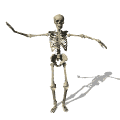|
A
Scary
Children's Story |
|
Making fitness a
priority in your life is not just for adults but should include
children and youths as well. Take
a close look at the following information from a recent survey.
-
60 percent of
children do not meet average fitness
standards.
-
Children today
expend four times less energy than children 40 years ago.
-
Approximately 40
percent of children already have at least one risk factor for heart
disease and that is because of reduced fitness due to an inactive
lifestyle.
-
In Grade two, one
out of four children cannot touch their toes.
-
76 percent of
elementary school girls and 26 percent of boys cannot do one chin up.
-
Half of all teenage
boys and three-quarters of all teenage girls cannot walk up and down
stairs for longer than six minutes, without straining their
cardiovascular system.
-
Twelve year old
children drink an average of two and half cans of soda
a day and eat on average one out of three meals per day away from the
family home.
-
The North American
diet today contains 31 percent more fats and 43 percent less complex
carbohydrates than it did in 1900.
-
Children do 75
percent less exercise today compared with children 100 years ago.
-
An Obese preschooler
has a 25 percent chance of becoming an obese adult, and an obese
teenager has a 75 percent chance of remaining obese for life.
20 percent of today's children and teens who are overweight,
are overweight enough that it will threaten their future health.
-
Between 1960 and
1980 obesity rates in North American children six to eleven years old
increased 54 percent, and Super Obesity rates rose 98 per cent.
 |
The level of activity for
children doesn't even come close to meeting the bare minimum necessary
for Good Health. Physical education classes (if they do have them) are
at best 30 minutes twice a week and only 25% of North American School
high school students participate in them.
|
They spend the rest of their time sitting in class, watching
television, playing with computers, video and board games or simply
reading. They get bussed to school and driven to and from their
friends houses.
In the early 1980's, while adults got hooked on the fitness craze,
children's fitness actually started to decline. In fact muscular
strength, muscular endurance and flexibility of children between the
ages of ten and fourteen dropped by up to 25 percent. You should also
note that no matter how much milk your child drinks, the Calcium
(which is necessary for growing bones) will not get into those growing
bones without regular weight bearing activity. (walking . . . skipping
. . . running). A child
should be active for at least one hour per day
doing some sort of physical activity.
|
Sorry... I know the statistics can be scary or even shocking, but
information can be a good thing if it is used properly.
|
 |
Lead by example, eat right, participate in active games as a family,
and involve your kids in sports or other forms of exercise. It
is our responsibility to educate and provide healthy guidance to the
next generation!
|
|
|
|
Healthy
Halloween Candy? |
|
Dark
Chocolates are an excellent source of antioxidants. Try to buy
individually packaged small chocolates in any shapes! Just because it's
Halloween doesn't mean that you need to actually buy candy or chocolate
made specifically for halloween. As long as the chocolates are
individually packaged, you can dress them up later with some colorful
orange ribbons. You'll find that decorating an existing package will be
even more fun, and keep in mind that these healthy chocolates will not
come cheap. But kids will understand once they taste the purity of the
halloween candy that: good things come in small packages.

So what
exactly is the difference between a healthy chocolate and a a normal
chocolate bar you might buy anywhere? The difference is in the ingredients
of course: bad chocolate is filled with things other than chocolate. The
best chocolates are those made up mostly of pure dark chocolate. If the
label of chocolate says it contains any of the following, do not buy it:
milk, sugar, wax, oil, syrup, or any extremely complicated names.
That's usually a sign that there's something fishy going on with the
quality of this chocolate. Think about this: chocolate companies are
making a killing by filling what people think is chocolate with a bunch of
other products like wax, sugar, milk and other ingredients that are
inexpensive fillers.

|
|
|
Elite
Bodyweight Exercise of the Month! |
|
Oblique Crunch

Summary:
Well, you can't really see my friends knees to the side, but
you get the idea! The oblique crunch is a good crunch
exercise that isolates the oblique muscles on the side of your
abdomen. A great exercise to incorporate into your ab
routine!
Target:
Sides and
Midsection (obliques and rectus abdominus)
Count:
2 count
Description: Starting
position lying flat on your back with your knees bent and to
the side. With your hand behind your head, crunch both
shoulders off the floor and return to starting position.
Click here for a better picture.
|
|
Controlling the
Halloween Monsters |
What
may be the most frightening to you at Halloween is not ghosts or
goblins but the thought of what all that candy can do to your kids'
health and teeth. For health-conscious parents, Halloween can be
tricky. Do you set limits? Do you let kids decide how much to eat?
There isn't just one right answer. Instead, use your best judgment
given what you know about your child's personality and eating habits.
Kids
who generally eat just a couple of pieces and save the rest might be
trusted to decide how much to eat. But if your child tends to overdo
it, consider setting limits.
Here
are some more tips for handling the Halloween treats:
-
Before kids go trick-or-treating, try to serve a healthy meal so
they're not hungry when the candy starts coming in. This will
prevent sugar highs and nasty upset tummies!
-
Know how much candy your child has collected and store it somewhere
other than the child's room. Having it so handy can be an
irresistible temptation for many kids.
-
Consider being somewhat lenient about candy eating on Halloween,
within reason, and talk about how the rest of the candy will be
handled. Candy and snacks shouldn't get in the way of kids eating
healthy meals.
-
If
a child is overweight — or you'd just like to reduce the Halloween
stash — consider buying back some or all of the remaining Halloween
candy. This acknowledges the candy belongs to the child and provides
a treat in the form of a little spending money.
-
Be
a role model by eating Halloween candy in moderation yourself. To
help avoid temptation, buy your candy at the last minute and get rid
of any leftovers.
-
Encourage your child to be mindful of the amount of candy and snacks
eaten — and to stop before feeling full or sick.
You
also can offer some alternatives to candy to the trick-or-treaters who
come to your door. Here are some treats to think about giving out:
-
Non-food treats, like stickers, toys, temporary tattoos, false
teeth, little bottles of bubbles and small games, like tiny decks of
cards (party-supply stores can be great sources for these)
-
Snacks such as small bags of pretzels, sugar-free gum, trail mix,
small boxes of raisins, and popcorn
-
Sugar-free candy
-
Small boxes of cereal or cereal bars.
Try to avoid or limit these unhealthy snacks:
-
Sticky treats like gummy candies, jelly beans,
raisins and caramels are bad for dental health.
-
Full-sized candy bars. Some chocolate bars
contain high amounts of saturated fat. The worst offenders are
Mounds , Hershey's Milk Chocolate Bar and Almond Joy.
-
Chips Ahoy!, Oreos, Hostess HOHOs and other
snack cakes, Keebler Club & Cheddar Sandwich Crackers, and Starburst
Fruit Chews were all voted the worst vending machine snacks for kids
by Center for Science in the Public Interest.
But
remember that Halloween, like other holidays, is a single day on the
calendar. If your family eats sensibly during the rest of the year, it
will have a more lasting impact than a few days of overindulgence.
|
|
It's
Go Time! |
|
"Everything
in moderation" This pertains to more than just
halloween, but still holds true at this time. The
bottom line is to be smart and don't over-indulge.
This goes for both kids and adults. Hey, if you have
or are going to, spend all that time trying to get into
shape and be healthier, you better be prepared to jump right
back into it after stuffing your face with all that sugar
and fat!
The children
just have different priorities so it's our job to provide
both guidance and education when it comes to nutrition and
exercise. Are you being a good role model for them?
Kids see right through the "do as I say, not as I do"
attitude, so if you want to make an impact... start with
yourself. Health and fitness can be contagious
especially when you are a parent!
For prior issues of this
newsletter go to
www.todayfitness.net/news.
Good Luck!
Pete
Mazzeo, CPT
pmazzeo@todayfitness.net
Happy
 | |